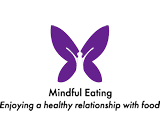 How To Stop Overeating With ‘Middle-Way’ Eating
How To Stop Overeating With ‘Middle-Way’ Eating
Webinar: ‘How To Stop Binge Eating’
I’ve worked with many people over the years, and the vast majority of them have a history of yo-yo dieting where they have a tendency to swing between extreme behaviours of being either ‘on’ or off’ a diet and nowhere in between. The all-or-nothing mindset is very common, and it can really get in the way of moderate, balanced eating, promoting a vicious cycle of food restriction or ‘perfect’ eating and overeating. I use the analogy of a pendulum swinging from one extreme to the other; in contrast, with middle-way eating you’re aiming to settle more around the central point. Think of it as a packet of biscuits- if a person is on a strict diet they might not allow themselves to eat a single biscuit, but if they give up the diet after a few days or weeks they might go back to eating biscuits, not just one or two but possibly the entire packet. This is because they might not be ‘in the zone’, and whenever they’re not following a diet 100% they might tend to overeat biscuits. This is why people who don’t trust themselves around food might put themselves on diets as they feel it’s the only way they can control their eating. They feel that in order to lose weight they need to follow someone else’s rule book (a diet plan), when in fact what they will benefit from far more is to set up their own personalised way of balanced eating.
“I’m thrilled that I’m losing weight and I can’t believe I can actually lose weight and not hate the process. It’s all thanks to you!”
Tackle All-Or-Nothing Thinking And Behaviours To Stop Overeating
 All-or-nothing thinking and behaviours can maintain yo-yo dieting or cycles of restriction and overeating, keeping you trapped. You swing between thinking you’re either being a success or a failure at eating and nothing in between- it can be hard to spot any positives with your eating because you might only focus on the negatives or ‘failures’. This is often a symptom of rigid thinking.
All-or-nothing thinking and behaviours can maintain yo-yo dieting or cycles of restriction and overeating, keeping you trapped. You swing between thinking you’re either being a success or a failure at eating and nothing in between- it can be hard to spot any positives with your eating because you might only focus on the negatives or ‘failures’. This is often a symptom of rigid thinking.
Most people are confronted by social and other eating situations all year round, and leading up to an event they might try to be strict with their eating because they see social eating as a roadblock to ‘good’ eating, and they envisage themselves fully indulging during those events/holidays, with no moderation, restraint or control. They find themselves regularly sabotaged by life going on around them, making them feel powerless to adopt consistent, long-term healthy eating practises or weight loss / weight maintenance strategies. Training yourself to adopt more middle-way practises can be empowering, and help you to feel confident when it comes to managing the food environment.
We don’t enjoy living at the extremes- we’re generally happier when we’re practising moderation, as it’s more in line with our body’s needs and our emotional needs. Awareness is key, so if a person can become more aware of any extreme thoughts or beliefs they might have in relation to health goals, eating, food and dieting, and identify crooked thinking and attitudes that keep them stuck in all-or-nothing, self-limiting behaviours, they will find themselves in a better position to manage choice, as well as stop overeating or at least reduce how often they overeat.
Eat Mindfully To Achieve ‘Middle-way’ Eating
‘Middle-way’ eating is about not engaging in extreme eating behaviours such as bingeing and restricting, just balanced, enjoyable, moderate eating. It’s about eating in a way that’s in your own best interest, and about giving yourself choice and permission around foods. If we try to avoid eating foods we love we can end up craving them more. As a client once said to me: “abstinence feeds obsession”. At first, you might find it easier to abstain from foods if you feel ‘safe’ with a few boundaries in place, but over time, aiming to eat any food in moderation is a good goal.
Giving yourself permission around foods whilst thinking before you eat and being selective with foods means that you can learn to eat the foods you love when you really want to eat them- not just eating for the sake of it, and selecting what you really want to eat, whilst being able to pass on the rest. Many people have a deeply ingrained belief that they must clear their plate, whereas middle-way eating (mindful eating) is about listening to your body and stopping when you feel you’ve had enough to eat- from my experience leaving some food on the plate is something a lot of people struggle with. It’s worth connecting with your fullness levels, and whether you’ve reached the point where you’ve stopped enjoying what’s in front of you and you’re just eating for the sake of it.
 All-or-nothing thinking and behaviours can fuel a sense of guilt and shame around eating, and this only worsens a person’s relationship with food. Some people eat secretly, and this can stem from a fear of being judged for eating, when in fact the judgement is probably coming mainly from the self. Calling foods ‘good’ or ‘bad’ doesn’t help all-or-nothing thinking and ‘guilty’ eating. No one food is ‘bad’, it’s how much of it you eat and how often you eat it that counts.
All-or-nothing thinking and behaviours can fuel a sense of guilt and shame around eating, and this only worsens a person’s relationship with food. Some people eat secretly, and this can stem from a fear of being judged for eating, when in fact the judgement is probably coming mainly from the self. Calling foods ‘good’ or ‘bad’ doesn’t help all-or-nothing thinking and ‘guilty’ eating. No one food is ‘bad’, it’s how much of it you eat and how often you eat it that counts.
“I realised I’d always categorised food into ‘good’ or ‘bad’ and the moment Emma suggested I relax this method and give myself permission to eat any food, something clicked in me”.
Mindful eating is about being present with food, savouring and enjoying it without guilt because we have a sense of well-being and peace around the food choices we’ve made. It’s also about listening to the body and considering what and how much to eat in any given situation, as well as whether to eat in the first place and considering not just enjoyment but nutrition too. Mindful eating also allows for occasional whimsical eating (because life happens!), without an accompanying sense of collapse. In contrast, mindless or ‘autopilot’ eating includes eating out of pure habit because of external cues such as the sight / smell of food or other people eating, or because we feel we’ve blown it with our eating so we decide to carry on (snowball effect), often a lack of enjoyment of the food and a sense of regret after eating, whereby you wish you’d made a more satisfying and enjoyable choice, or perhaps because you feel uncomfortably stuffed. With mindful eating we can learn to savour food and we can find ourselves enjoying less food more. ‘TV eating’ is a good example of a scenario where it’s easy to overeat mindlessly and even lose track of how much we’re eating because we’re distracted by what we’re watching and not focused on the food. This can also happen if a person is eating for emotional reasons.
Tackle Emotional Eating
Whilst we can practise mindful eating to achieve more ‘middle-way’ eating, it can be hard to stop overeating on a regular basis if a person is an emotional eater. Food and eating can symbolise different things to different people. For example, eating can be a way to take a break, it can have a calming effect, it can act as a distraction or provide a temporary release from difficult situations or from one’s own state of mind; it can be a way of taking or relinquishing control and it can even be a means of rebelling or ‘rule breaking’. Food might be used as a way to self-soothe or even self-punish. It’s possible to stop overeating or significantly reduce how often you overeat once you better understand your relationship with food and the main reasons why you might turn to food to ‘cope’. You can read my blog post: “Understanding Emotional Eating”.
The Importance Of Flexibility, Not Rigidity
Restrictive, rule-bound diets (such as having lists of allowed and forbidden foods) can encourage all-or-nothing eating behaviours so that when a person isn’t following a diet, they find it hard to  regulate their eating. Perhaps when they’re not on a diet they avoid ‘diet foods’ and overeat the foods they’re not allowed on the diet. With all-or-nothing thinking comes rigidity. Sometimes, underlying a rigid mindset is some kind of fear (such as fear of failure, fear of not doing things perfectly or fear of weight gain). When we learn to develop a less negative or anxious relationship with food, we naturally become more flexible in our thinking, attitudes and behaviours.
regulate their eating. Perhaps when they’re not on a diet they avoid ‘diet foods’ and overeat the foods they’re not allowed on the diet. With all-or-nothing thinking comes rigidity. Sometimes, underlying a rigid mindset is some kind of fear (such as fear of failure, fear of not doing things perfectly or fear of weight gain). When we learn to develop a less negative or anxious relationship with food, we naturally become more flexible in our thinking, attitudes and behaviours.
Mindful eating promotes a more flexible approach to eating. For example, if you eat a very large, overly indulgent lunch, your all-or-nothing mindset might feel that you’ve blown it and write off the rest of the day. With mindful eating, you’re thinking about what you’ve eaten without beating yourself up, and then making adjustments later on in the day, for example, by eating a light snack in the evening rather than eating another full meal.
Examples Of All-Or-Nothing Thinking, Attitudes & Behaviours
 Being either ON or OFF a diet and nowhere in between (either restrictive eating or overeating)
Being either ON or OFF a diet and nowhere in between (either restrictive eating or overeating)- Sticking to a diet plan perfectly, or not doing it at all
- Strict dieting before a holiday and then overeating on holiday
- Being ‘good’ all week and then overeating at weekends (vs. fairly consistent eating all week)
- Always clearing your plate (no matter how full you are whilst eating)- feeling unable (or being unwilling) to leave food on plate
- Always having seconds
- Being unable to stop eating a whole packet after just eating 1 or 2 (eg biscuits or rows/pieces of chocolate)- always having to finish the whole packet or not eating them at all
- Always having 2 courses not 3, or unable/unwilling to leave a restaurant not absolutely stuffed- and avoiding restaurants when you’re on a diet
- Always feeling the need or desire to eat or dish up large portions
- Overeating or mindless eating that frequently leads to regret
- Overeating at lunchtime, then feeling you’ve blown your diet/’good’ eating so you overeat for the rest of the day (instead of making adjustments and eating less for the rest of the day)- ‘blown it’ mindset
- Ignoring fullness levels and just eating because you want to, feel the need to, or because the food is there.
Assessing Your Eating
Your assessment of your eating is key, to help you avoid feeling a sense of ‘failure’, which affects motivation and self-belief. Don’t strive for perfect eating, just ‘good enough’ eating. Don’t be impatient to lose weight- slower weight loss allows for more flexible eating; and try not to label foods as ‘good’ or ‘bad’. Look back on your day’s eating and get into the habit of spotting the victories, no matter how small. They all add up! And if you’re struggling with chronic binge eating, it’s definitely worth exploring why you might be eating for emotional reasons.
Don’t expect yourself to completely abstain from foods you really enjoy- we’re hardwired to love the flavour of fatty/sugary or fatty/salty combinations (and food manufacturers know that!). You can learn to eat these foods in moderation, alongside healthier choices. Don’t see your eating as ‘right’ or ‘wrong’- just make observations, and learn from them.
Progress Is Never Linear
We’re only human, so progress is never linear. See progress on a sliding scale, most of the time aiming to move in the right direction, but some days you might not feel you’ve budged along the scale- and that’s ok. Just aim to get back on track in the coming days. The scale can move either way, and it might be that if you feel you’ve regressed, your all-or-nothing mindset, inner critic or ‘diet-head’ is at the helm again! It’s important to be realistic too- expecting yourself to stop overeating for good is unrealistic, but as long as you’re able to reduce how often you overeat and learn to enjoy and get real satisfaction out of eating in a more moderate way, that’s a huge achievement in itself.
Advantages And Benefits Of The Mindful Eating Approach
To illustrate the advantages of the mindful eating approach, here are ten features:-
1 No more restrictive diets
2 ‘Bad’ or ‘forbidden’ foods don’t exist; permission to eat all foods- no ‘right’ or ‘wrong’ way to eat
 3 Reduced feelings of guilt and shame around food- no more secret eating
3 Reduced feelings of guilt and shame around food- no more secret eating
4 Genuine enjoyment of food- by making helpful food choices, actually noticing food when you’re eating it, and eating when your body actually needs it
5 Feeling more relaxed around food and more in charge of food- food is no longer a fight, based on listening to your body’s internal cues about what, whether or how much to eat
6 Promotes a much better relationship with food (than simply just having a weight loss goal and going on diets)
7 Feeling more empowered through increased self-awareness- better understanding of your eating triggers, why you overeat, how you might be using or relying on food, why you’re struggling to lose weight or maintain your weight long-term, why you self-sabotage etc
8 Any weight loss is as a result of an improved relationship with food, not as a result of restrictive dieting
9 No ‘rule book’ to follow about what or how much to eat- genuine choice (based on your own inner wisdom)
10 Going on a valuable journey of self-discovery and self-insight, rather than just going on a diet.
So if there’s one thing you can start doing for yourself today, it’s working on that all-or-nothing mindset that tells you you’re either being a success or a failure, and nothing in between. Mindful eating is about self-regulation, not dieting. It ensures that you give your body nutritious, enjoyable foods in moderate quantities, there’s no sense of deprivation, and it also helps you to start trusting yourself around food. As always, it’s about balance, and about finding a long-term, sustainable solution that will enable you to put an end to yo-yo dieting for good and tackle overeating.
It’s great to see people feeling so empowered once I’ve introduced them to the concept of middle-way eating and they’ve had some time to try out this more flexible, mindful way of eating. Weight loss and long-term weight management really doesn’t need to involve strict dieting; it’s about giving yourself permission to eat the foods you enjoy whilst approaching those foods in a mindful way that’s in your own best interest. If you learn to eat in a more mindful, flexible way you’ll be able to discard those extreme and exhausting eating behaviours that make you feel out of control of food, and you can start to really enjoy a better relationship with food.
Review From A Client
Here’s a review from one of my clients which reflects how people can learn to stop the fight with food, tackle overeating and lose weight using the middle-way approach without having to resort to restrictive diets, enabling them to stop yo-yo dieting:-
“I’ve had issues around food for pretty much all my life. I’d binge eat then restrict myself and was always on a diet. Together with Emma, we explored reasons why and my attitude towards food. I realised I’d always categorised food into ‘good’ or ‘bad’ and the moment Emma suggested I relax this method and give myself permission to eat any food, something clicked in me. She was full of suggestions of ways to help me build my confidence and belief in myself to make this work including highlighting positive moments in my food diary to make them stand out – a game changer for me! Honestly this has been life changing, I feel so comfortable with my choices and feel like food no longer has a hold over me. No more bingeing and I’m losing weight without even feeling like I’m doing anything out of the ordinary! It’s also had a big impact on my mood and digestive issues making this even more worthwhile. I would definitely recommend Emma to all!”
More information and tickets for webinar ‘How To Stop Binge Eating’.
SPECIAL OFFER on one-to-one sessions: buy three sessions up front and get a 4th session FREE! Contact me via email HERE.
If you’d like to attend any of my talks, please click HERE for a summary of all talks. Click HERE to purchase tickets for any of my events via Eventbrite.
For more information about how I support clients, see ‘Services‘.

